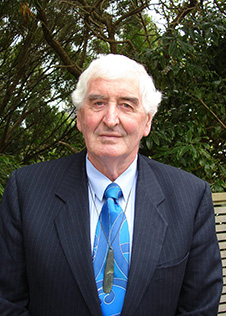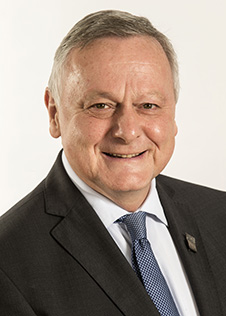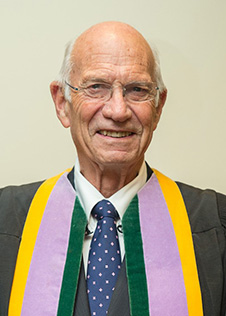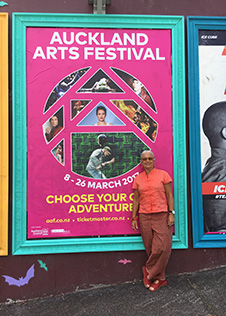Four extraordinary New Zealanders will be celebrated when they are conferred with honorary doctorates at graduation ceremonies in December.
Internationally-renowned surveyor and former New Zealand Surveyor General William Robertson ONZM; former chief executive of EY and chair of ANZ Bank New Zealand Ltd and Te Papa Tongarewa John Judge; a past president of the World Dental Federation and chair of the New Zealand Dental Council Dr Clive RossCNZOM; and former Director of the New Zealand International Arts Festival Carla van Zon ONZM are all being honoured for their contribution to society and the University.
Vice-Chancellor Professor Harlene Hayne, in announcing the doctorates, says the calibre of the four to be honoured at the December ceremonies is remarkable.
“We cannot help but be proud to have such accomplished and highly-regarded graduates in Mr Judge, Dr Ross and Ms van Zon, who have each individually made a lasting impact in their area of expertise, both within New Zealand and across the globe, and to honour Mr Robertson for his exemplary work in his field and his service to the University.
“Throughout our 150th anniversary year, the University has been able to acknowledge and celebrate some of our most prestigious alumni, and it will be a highlight of our final graduation ceremonies of the year to confer these honorary doctorates.”
Details of the conferments are:
Clive Ross – 4pm, 7 December
Carla van Zon – 1pm, 11 December
William Robertson – 1pm, 14 December
John Judge – 4pm, 14 December
Full profiles follow:
William Robertson ONZM

William Robertson
For his extraordinary contributions to the surveying profession over a 66-year career, William (Bill) Robertson ONZM (Ngai Tahu) is to be conferred with an Honorary Doctorate of Science by the University of Otago.
Mr Robertson's work has had influence and implications worldwide, including his pivotal role in identifying and planning many of Aotearoa's National Parks and coastal reserves.
Beginning his career with the Lands and Survey Department in 1954, Mr Robertson worked across New Zealand's back country, in Antarctica, and later across the world on disputed border issues and land administration projects.
In the following decades he used his combination of surveying and planning skills to identify high-value landscapes for environmental preservation across New Zealand.
During the mid-1980s Mr Robertson helped establish Otago's School of Surveying Bachelor of Measurement degree and implemented funding from the Lands & Survey Department and NZ Institute of Surveyors for a computer laboratory.
Professor Christina Hulbe, current Head of the School of Surveying, says Mr Robertson's support came at an important time in the development of the School and for the profession. That support continued as the School grew.
Mr Robertson says that through his career the intellectual value brought by the School of Surveying to the surveying profession has been particularly evident.
“Through the quality of its graduates, the Surveying School has done a tremendous job in bringing the profession to the leading edge of surveying and spatial applications and has adapted and aligned its courses to changing needs, new technology and international trends very effectively.”
Appointed as Surveyor General and Director General of the Department of Survey and Land Information (DoSLI) in 1987, Mr Robertson oversaw its transition to digital technology and achieved a level of operational efficiency previously unseen in any other western world survey and mapping organisation.
Following his time at DoSLI, he became a highly respected expert consultant, and was involved in the demarcation of five international boundaries in Africa and Asia. He also served as an expert advisor for Land Administration Projects for the World Bank, FAO, AusAID and NZAID in Asia, Africa, the Pacific and Albania.
“Surveyors trained at Otago are recognised as having the wide range of education and skills necessary to undertake difficult operational and strategic tasks in countries all around the world for the United Nations, World Bank, Asian Development Bank, Permanent Court of Arbitration and other International Development and Aid Agencies,” he says.
Mr Robertson's depth of knowledge on land tenure and rights has also been highly valued in New Zealand, and he is a long-standing advocate for this country's involvement in Pacific development.
During his time as Chair of the New Zealand Geographic Board, Mr Robertson was part of a collaborative effort to ensure location names reflected their bicultural heritage. He also was instrumental in both the New Zealand publication of the official country names map of the world, and part of a collaboration to compile the first official local geographical names for South East Asia and the Pacific for the United Nations Group of Experts on Geographic Names.
Professor Hulbe says throughout Mr Robertson's life and surveying career he has consistently shown how much he cares about human development and its connection with the land and its history.
To be recognised with the honorary doctorate by the only University-based Surveying School in New Zealand is a “great honour” says Mr Robertson.
“I wish to sincerely thank the the University of Otago for this prestigious recognition and for its generosity in awarding me an Honorary Doctorate of Science in this special celebratory 150th year.”
John Judge

John Judge
John Judge graduated from the University of Otago in 1974 with a Bachelor's Degree in Commerce (Accounting). Since that time he has maintained a close connection with the University in a number of ways.
His career and this continued involvement has earned him an Honorary Doctorate of Commerce.
While studying for his degree he took an active role in student administration, serving as the Otago University Students' Association representative to the University Council, and for two years as the OUSA finance representative, amongst other responsibilities. He was made a Life Member of the OUSA in 1978.
Commencing his career with the company that became EY, he travelled to London with the firm and spent four years consulting in international corporate tax. On his return to New Zealand in 1983, he spent eight years with EY in Wellington, being made partner, and working in the field of taxation and mergers and acquisitions.
He moved to Auckland where he first ran the Auckland office and then became Chief Executive of EY for 12 years. During this time he also held various international roles within EY and was on the Board and chaired Te Papa Tongarewa.
In 2007, he left EY to pursue a career in governance and corporate consulting. His roles have included chairing ANZ Bank New Zealand Ltd and the Accident Compensation Corporation, being a board member of Fletcher Building Ltd, and holding roles in a number of private companies including AD Instruments, Biotelliga and Hydraulink.
He has also been involved in supporting sports and the arts throughout his career – from his involvement with Kiwi Tennis Club in Dunedin pre-university to being on the Board of Tennis NZ, and from the Board of Wellington City Art Gallery to chairing the foundation that raised the finances to re-build the Auckland Art Gallery Toi o Tamaki. He now chairs the Auckland Arts Festival and is on the Board of the Auckland War Memorial Museum.
In addition, he is a Fellow of the Chartered Accountants of Australia and New Zealand, on the Board of the New Zealand Initiative and a Chartered Fellow of the Institute of Directors through which he has contributed by mentoring women seeking board placements.
Throughout his career he has continued his involvement with the University, particularly the Division of Commerce, where he was an inaugural member of the Advisory Board, Inaugural Executive in Residence and has been part of the Visiting Executive Presentation programme. He has given his time and advice to students and staff who always welcome access to his experience and expertise.
Mr Judge says he is immensely touched and greatly honoured to be receiving the honorary doctorate because of the high esteem in which he holds his alma mater.
Dr Clive Ross CNZOM

Dr Clive Ross
Clive Ross progressed from star dentistry student to internationally renowned dentistry leader over a long and distinguished career, yet never stopped contributing to the University of Otago and its Faculty of Dentistry.
His career of excellence and achievements, and his lifetime of contributing to New Zealand's future dentists, has led to his receiving an Honorary Doctorate of Laws from the University of Otago.
Clive Bentley Ross CNZOM gained his Bachelor of Dental Surgery at the University of Otago in 1961. During that study he was awarded Distinctions in Conservative Dentistry and Children's Dentistry, and the L.P. Davies Prize in Children's Dentistry.
He served as an external examiner to the Faculty of Dentistry and was commissioned by the faculty to review aspects of its hospital services.
The awards continued during his professional career. In 1967 Dr Ross was made a Fellow of the Dental Surgery of the Royal College of Surgeons of England. In 1968 he became a Fellow of Royal Australasian College of Dental Surgeons. He has been a Fellow of the Australasian section of the International College of Dentists (ICD) since 1976. He was awarded an Honorary Fellow of the General Dental Practitioner Royal College of Surgeons.
He is a Fellow of the Pierre Fauchard Academy and a Fellow of the Academy of Dentistry International. He was made an Honorary Member of the Australian Dental Association in 1980, an Honorary Member of the American Dental Association in 1986, and a Fellow of the New Zealand Dental Association in 1988 and subsequently life member.
Dr Ross was awarded the Academy of Dentistry International Dentist of the Year in 1996, the first such award to a New Zealand dentist.
In 1997 he was recognised by the government with the Companion of the New Zealand Order of Merit (CNZOM) for services to dentistry.
Until retirement, Dr Ross was a private dental practitioner with specialist registration in restorative dentistry. He served as the Clinical Director of Regional Oral Health Services in Auckland, and provided postgraduate training for the Master of Dental Surgery in Hospital Dentistry and Oral and Maxillofacial Surgery.
He was a member and Chairman of both the New Zealand Dental Association Executive and the New Zealand Dental Council. He was Chairman of the New Zealand Oral Health forum 2000 and was President of both the New Zealand Society of Prosthodontics and the New Zealand Endodontic Society.
He has served as Vice-President, President and Past-President of the Australasian section of the ICD, has been an ICD International Councillor and Treasurer and is currently President of the ICD International Council.
He was Chairman of the joint WHO/World Dental Federation working group on Workforce Planning, a member of the WHO expert committee for two years and a member of the Asia Pacific Dental Federation Committee on Dental Health. He served as Council Member, Vice-President and President of the World Dental Federation.
He was appointed to the New Zealand Board of Health, serving for six years and served on the international body responsible for setting standards in hospitals.
Dr Ross has continued to contribute to the University of Otago since graduating. He has been a strong advocate for the Faculty of Dentistry, acted as an examiner for postgraduate examinations and has supported and mentored staff.
His work, achievements and extensive service to dentistry nationally and internationally bring credit to the University.
Dr Ross said he received news about the honorary doctorate, from University of Otago Vice-Chancellor Professor Harlene Hayne, “with a deep sense of humility and surprise”.
“Never did I imagine this would happen and I carry this honour with true pride and sincere thanks to the Chancellor and Vice-Chancellor.
“I have to say that I was totally overwhelmed by this recognition and feel both humbled and deeply appreciative that I was considered worthy of such an award. I am still coming to terms with it.
“I have always given my best to my professional life and the health and welfare of the people I have served. I have thoroughly enjoyed the opportunity to meet and work with hard working colleagues throughout New Zealand and the extraordinary leaders of the profession both in New Zealand and internationally. I feel privileged to have been part of this very special group of people.
Carla van Zon ONZM

Carla van Zon
The significant contribution Physical Education alumna Carla van Zon ONZM made while leading New Zealand's premiere arts festivals has been recognised by the University of Otago, which this month will result in her being conferred with an Honorary Doctorate of Laws.
Throughout her four-decade career – which culminated with her serving as Director of both the Auckland Arts Festival and New Zealand International Arts Festival – van Zon says she prioritised bringing diversity to major events to increase the festivals' cultural relevance.
Her involvement with arts festival management began in 1989, with the Wellington-based biennial New Zealand International Festival of the Arts.
“A friend who worked at the Festival had to have emergency surgery and I did her job for three weeks, following which the Festival director asked me to stay. Although previously I had danced at the Flying Kiwi Fringe Festival 1986, swept stages at the International Festival in 1988, and attended events at those first two Festivals, in some ways it was quite by accident that I ended up working at the New Zealand International Festival of the Arts.”
She became Festival executive director in 1996, and then artistic director from 2000 to 2006. Under her management the event was profitable for the first time, won four national tourism awards and in 2001 gained the Dominion Gold Award for outstanding contribution to the Wellington economy.
Van Zon became artistic director of the Auckland Arts Festival (AAF) in 2013; she retired from the role after her fourth and final festival in 2017.
Between directorships of the Wellington and Auckland festivals, she was International Manager for the Arts Council of New Zealand Toi Aotearoa/ Creative New Zealand (for three years), during which time she developed the International Strategy for New Zealand artists and oversaw the management of New Zealand's presence at the Venice Biennale.
Before transitioning to Festival organisation van Zon was a dancer, choreographer, arts producer, stage manager, lighting rigger, dance teacher, high school teacher, arts marketer and tour manager. She credits these experiences with giving her a thorough understanding of all aspects of the sector.
Originally hailing from Titirangi, van Zon came to Otago's School of Physical Education “specifically because it was the only place to study contemporary dance.”
“The dance programme was great – my first teacher was Gaylene Sciascia and I also studied Māori waiata and haka with Piri Sciascia.”
But it was Physical Education School Director Professor Philip Ashton Smithells who had the most significant impact.
“PAS, as he was known, was an extraordinary man and because of this the PE School was not just about physical excellence and sport but also about the mind, and the philosophy of healthy mind and body working together.”
She followed her Physical Education and Teaching diplomas with a MA in Dance and Arts Administration from George Washington University in the USA, before returning to New Zealand to work as a freelancer in all areas of contemporary dance from reviewing to producing, performing and marketing.
Van Zon describes her subsequent approach to festival management as a mixture of “logical hard work”, research and creative ideas, and “long-term thinking” to ensure the festival fits the community.
“It is a balance between financial responsibility and delivering great arts experiences to all members of a community. Arts has its own intrinsic value but is can also change the world step by step.
“It is a way for us to learn more about each other and ourselves, it can enhance social cohesion, and add to or change an individual's values and goals. And it can make us happy, give us a laugh, make us cry, or get angry and want to change things. So a festival director must always think about the people in the community where their festival takes place and about the place itself.”
Because festival organisation presents unique challenges it requires specialist skills, as well as some every day common sense.
“I'm pleased I've also sought to find new challenges for myself and audiences and been open to change.”
The ability to be both pragmatic and adaptable has led to a long list of personal highlights and achievements, including commissioning, producing, presenting and championing seminal New Zealand works, such as Hone Kouka's Waiora, Witi Ihimaera's Woman Far Walking, Mitch Tawhi Thomas' Hui, Jack Body's opera Alley, Vela Manusaute and Anapela Polataivao's musical The Factory, and Renee Liang's opera The Bone Feeder.
She has also taken great satisfaction in mentoring the next generation of artistic directors, including Tama Waipara who directs the Te Tairawhiti Arts Festival and WOMAD director Taranaki Emere Wano.
She has also championed the careers of many of New Zealand's theatre and arts practitioners such as writer and actor Nancy Brunning, directors Jason Te Kare and Sara Brodie, writers Mei-Lin Te Puia Hansen, Victor Roger, Renee Liang and Hone Kouka, and composers Gareth Farr, John Psathas and Dame Gillian Whitehead.
Van Zon takes pride in having brought international experiences to New Zealand. She was instrumental in bringing the Edinburgh Military Tattoo to New Zealand for its first ever appearance outside of Scotland, and bringing Groupe F, the world's greatest fireworks artists, to Wellington and Auckland.
She has also backed “smaller, more intimate experiences” such as Rhinoceros in Love from China, The Chorus Oedipus from Korea and work by choreographers such as Sidi Larbi Cherkouai and Akram Khan.
“I feel I have contributed to the arts, and particularly festivals, having a public face, being successful and becoming accepted as a necessary part of the cultural repertoire for many cities and towns around the country.”
“I am not a sing in the shower sort of arts person – accessibility is for me an essential part of presenting arts. And accessibility is not just about economics. It is also about creating a place the audiences feel comfortable going to. For example, venues – be it a marae or a theatre – all have kawa, and that can be a barrier for some people. I have tried to work with or find ways around barriers because I believe everyone is entitled to, and should have, brilliant arts experiences to enhance their lives.”
Van Zon has been lauded for expanding festival offerings to include more Asian, Māori and Pacific content and material that is more reflective of contemporary New Zealand.
When working at the Auckland Arts Festival she made sure it reflected and celebrated Auckland's diverse communities, and the success of this initiative was highlighted in the legacy project Whanui – a series of five community projects that reached into and were accessible to different areas and cultural communities of Auckland.
She attributes this to her parents, who were immigrants to New Zealand in the early 1950s.
“They came with only a little English, in fact English was not my first language. My father spoke five languages, and both were very open and inclusive people – they passed this on. Also, my father worked for an airline and I travelled from a young age. So, exposure to different people, ideas and communities was an integral part of my life.”
Her mother (a dancer and a dance teacher) and father (a guitarist) both instilled in her the belief that art is an essential part of life.
“Much of wanting to make festival programmes more inclusive is due to them, and also my belief that in New Zealand we live in a world that still exists within.”
For more information, contact:
Vice-Chancellors Office
Email vice-chancellor@otago.ac.nz
Fiona Clarkson
Manager, Communications Advisory Service
Email fiona.clarkson@otago.ac.nz
Tel +64 3 471 6272
FIND an Otago Expert
Use our Media Expertise Database to find an Otago researcher for media comment.